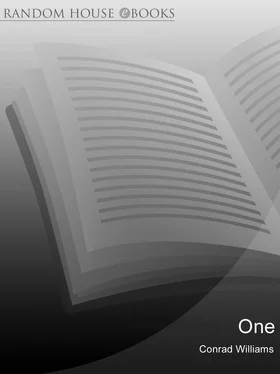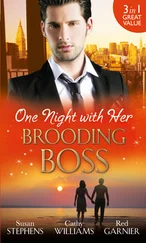'My God,' Jane said. 'My God.'
LONDON 38
14. DESCENT
Aidan skipped across chevrons at a slip road. Becky walked a little way ahead of him, to his right. Jane brought up the rear, pushing the wheelbarrow. He was itching to get rid of it. There was no need any more. Their packs were full, the road was coming to an end. Within three days they would be in London.
He was hunched over the barrow, his breath coming in short, shallow scoops. Becky kept admonishing him, telling him to stand up straight and breathe normally, but the pain in his chest wouldn't allow it. One foot in front of the other. Twelve miles a day. Three days. He imagined Stanley standing at the balcony, watching out for him. He will be here, Mummy. He will.
Whenever he felt his mind bending towards dark things he rescued himself with thoughts of Stanley. In this way he believed he was confirming Stanley's survival and reminding himself what it meant to know order, to be human. He thought of taking his son to the fair in Hyde Park. Stanley must have been around three. Jane had been disgusted by the prices, but to see his son laughing to the point of losing control was worth ten times what he had paid. He had decided to let Stanley be in charge after that. They would otherwise have gone home and watched TV, but he didn't want to be locked inside with Cherry tutting and shaking her head all afternoon. They had walked – slowly, very slowly – for miles. They stopped often, to look at the scrollwork on the iron frame of a bench, to watch the kites being flown, to trace the pattern of bark on a tree, to honk at the geese on the Serpentine and dodge the squirrels who barred their path aggressively, expecting nuts. They played peek-a-boo at the statue of Peter Pan and Stanley demanded to be picked up so he could pat the head of the bear at the end of the path near the Italian Gardens. They played on the pirate ship and Stanley made Jane laugh so hard when he said 'Shiver me timbers' that Jane's nose began to bleed.
They stopped off at Baskin Robbins for ice cream on the way home. Stanley was nodding into his raspberry sorbet. Blond hair. The cowlick over his left ear that would not stay down. 'Daddy, um, when we get home which toy do you want to play with? Walter or red Power Ranger? You can have Walter if you like, but I love Walter the best.'
He was snoring almost before he finished his sentence. Jane scooped him up and carried him onto a bus. They got off at Maida Vale and Stanley was deeply asleep, head on Jane's shoulder, melded to it, as though this configuration of muscle and bone had been waiting all these decades for just this one boy.
Cherry had been at him the moment his key found the lock. Needs his sleep. Worn him out. A three-year-old boy can't. A three-year-old boy shouldn't. You. You. You.
He'd let it all slide past him, moved slowly past her and put Stanley to bed. Best day of my life, Stanley. Thank you, mate. Night-night.
They followed the hard narrative of the road, navigating their way around its punctuative tragedies. Jane found himself thinking how it had gone for them, these car-bound travellers, long-distance or quick hop, going to or returning from. No time to get away. They must have seen what it was, perhaps had the vision melted into the back of their skulls before life was struck from them. He remembered an old annual he had been given for his birthday, something that had bothered him greatly when he was a boy. It was supposedly filled with adventures and excitement, but all he saw were nightmares. Nuclear war. Man-eating polar bears. Innocent aliens hunted for sport.
There had been a story about a man who tests a dream machine; his dreams are relayed to a screen for scientists to view. He dreams he is on a spaceship moving faster than anything in the galaxy. He reaches the end of space and sees what is beyond it. But something goes wrong. There is an explosion. His body dematerialises. The scientist dies and his assistant, blinded by the explosion, calls out vainly to find out what was revealed, but, as the last panel explained, It was not for living men to tell.
The scientist's body had been in close-up, his mouth open, his eyes open, strangely pimpled. It had stayed with Jane for months, that image. It was with him now.
What did you see?
There had been those oily miasmal colours, impressive even at the depths Jane had experienced it. What must it have been like at the doorstep? He felt a pang of envy, despite knowing that to have seen it would have been to die. These people in the cars flash-fried, brains scrambled, the upholstery of the seats in which they perished barely touched in many cases. It must have hit like a tidal wave, tearing the breath from everything in its path.
He stopped in the road. Aidan had tired of his skipping game and was walking alongside Becky, his hand enfolded by hers. The broad green bandeau she was wearing glittered with dust. The bodies in the cars, lying on the floor swollen, split and black, like baked apples left too long in the oven. The rats wouldn't touch them. They ate only the bodies they found indoors. They didn't eat what was outside. The dust, was it some kind of appetite suppressant? And something else. He had been blind.
'Becky?' he called. She turned in the road, swinging Aidan around with her. He was still giggling when Jane asked: 'Why is nobody decomposing?'
They found a veterinary surgery in Stevenage's industrial area where it cosied up to the motorway. A small laboratory was connected to it at the rear, where cages contained dead animals that had tried to bite their way through the wire mesh. Boxes of drugs were stacked in a cupboard. Someone had been here before them. Drawers had been pulled out and tipped empty: laryngoscope blades and draining tubes; worming treatments and syringes. Refrigerators and cupboards had disgorged their contents, none of which were of any use to desperate people. Watchglasses of agar. Test tubes and flasks. Injectables. Liquids, powders and pastes. Dermatological oils. Becky pocketed a skin stapler and some removal forceps as well as some pads and tape and a sealed pack of suture needles.
A microscope had been knocked over but Becky checked it over and it seemed all right. She prepared a well slide with the dust added to a few drops of quieting solution and clipped it to the stage. She was quiet for some time, alternating between the coarse- and fine-focusing knobs.
'Any news?' Jane asked. Aidan was inspecting a broken centrifuge, when he wasn't glancing at the evidence of the animals' frenzied attempts to escape.
'I . . . I'm not sure,' Becky said. She lifted her head away from the eyepiece. 'It looks . . .' She sighed. Shook her head. 'Well, it looks . . . cellular.'
They camped that night on the fairway of a golf course west of Welwyn Garden City. Large amounts of litter were sweeping through the air. London's love letters to them. Some of it plastered against the face of the tent. A Washington Post . Sheets of unintelligible data. An airline sick bag. They could see the motorway from their tent, through a clutch of famished trees. Aidan hadn't said much all day. Jane wanted to talk to him, bring him out of his shell and find out what was wrong, but he was still digesting the revelation in the laboratory. He couldn't understand what it meant. And it was doubly confusing to think that it might mean nothing. Cells. Dead spores on dead air. Just another thing that had shot its bolt at the end of the world.
Only Becky had not said they were dead. She'd told him that she'd read about cells that had survived for millennia, trapped in ice.
'But the soil. It's too dry. Anything good in it has been blowtorched out of it. It's dead ground.'
'I know,' Becky had said. And chewed her lip, looking at him with that mix of worry and compassion.
Читать дальше












